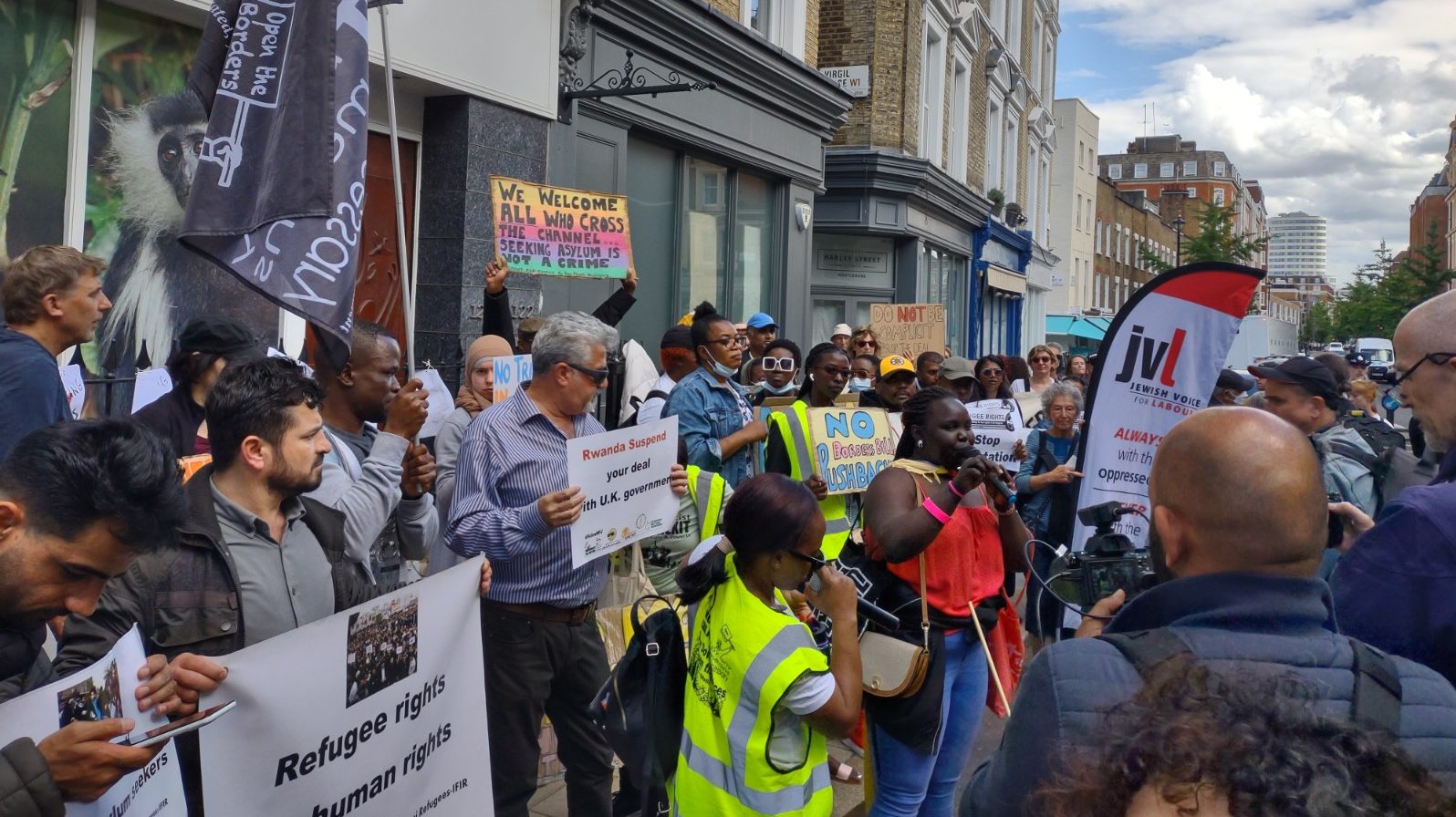However, a mislaid document seen by the Express suggests the government is eyeing plans to send asylum seekers to Rwanda on commercial flights as soon as June.
How have campaigners reacted?
Opposition to the plans has continued after the government’s scheme passed the final parliamentary hurdle. More than 250 organisations across civil society, including Detention Action, Care4Calais and Oxfam GB have signed a letter pledging to make a stand against the removals plan, describing it as “a shameful and performatively cruel law that will risk people’s lives”.
Steve Smith, CEO of Care4Calais said: “This bill does nothing to make Rwanda a safe country for refugees. All the problems with Rwanda’s asylum system, including, for example, the fact they haven’t granted refugee status to the single largest nationality claiming asylum in the UK, Afghans, remain. Politicians are playing fast and loose with the future of human beings, and it must be stopped.”
Rishi Sunak introduced the Safety of Rwanda act after the Supreme Court declared Rwanda to be an unsafe country. By contradicting this ruling, the government will only exacerbate the “chaos” in the asylum system, warned Enver Solomon, chief executive of the Refugee Council.
“Last year, the government decided that it would stop processing the vast majority of asylum claims,” said Solomon.
“As we predicted at the time, there are already tens of thousands of people who are now in the UK indefinitely, shut out of the asylum system, banned from working, and with no route to settlement.“
Advertising helps fund Big Issue’s mission to end poverty
More than 250 local councillors have signed a statement saying they will do all they can to oppose the bill. In a statement organised by the Migrant Champions Network, they said: “We know that plans to send people seeking asylum to Rwanda have already caused real harm to our residents and our communities. To have risked everything to seek safety in the UK, only to be threatened with being sent thousands of miles away, has caused untold psychological damage to the people at risk.
“As local councillors, we pledge to do all we can to resist these plans, and to support people at risk – whether that’s through helping residents at risk to access legal advice, connecting with community groups to safeguard people at risk of removal, or otherwise.”
International organisations also warned the plan is “unnecessarily cruel”.
“Rather than outsourcing its responsibilities under international law, we urge the government to abandon this misguided plan and instead focus on delivering a more humane and orderly immigration system at home. This includes scaling up safe routes, such as resettlement and family reunion, and upholding the right to seek asylum,” said Denisa Delić, director of advocacy at International Rescue Committee UK.
A timeline of the government’s attempts to send asylum seekers to Rwanda
14 April 2022: Boris Johnson announces the plan to send asylum seekers to Rwanda for their claims to be processed.
14 June 2022: First flight to Rwanda is scheduled to take off, but is cancelled while on the runway after intervention from the European Court of Human Rights.
Advertising helps fund Big Issue’s mission to end poverty
6 September 2022: Boris Johnson leaves office and Liz Truss becomes prime minister.
25 October 2022: Liz Truss leaves office, Rishi Sunak becomes prime minister.
19 December 2022: High Court rules the government’s plan is lawful.
29 June 2023: Court of Appeal rules the Rwanda plan to be unlawful, concluding Rwanda is not a safe country.
15 November 2023: The Supreme Court rules the Rwanda plan unlawful.
5 December 2023: Rishi Sunak’s government signs a new treaty with Rwanda.
Advertising helps fund Big Issue’s mission to end poverty
6 December 2023: Government brings Safety of Rwanda Bill before parliament.
22 April 2024: The Safety of Rwanda bill passes parliament after peers concede on two amendments.
How much is Sunak’s Rwanda plan costing?
The taxpayer will foot a bill totalling £1.8m for each of the first 300 people removed to Rwanda, the National Audit Office found in March.
But even if no planes take off, the government has committed to pay Kigali £370m. Sunak argues the plan is a deterrent which will “stop the boats”.
Even by the end of 2023, the scheme had cost £270m. Yet the IPPR think tank has warned the eventual cost could balloon to £3.9bn if every asylum seeker stays in Rwanda for five years – an estimate disputed by the Home Office.
What’s next for the Rwanda plan?
While it took late-night peril to get the bill through parliament, experts have warned it’s not a done deal. Sunak said 150 judges and 25 courtrooms had been made available to deal with legal claims “quickly and decisively”, but this was contested by the judiciary, who told the Law Society Gazette decisions on deployment: ”Remain for the independent judiciary. These matters should not be drawn into the political arena.” Putting the bill into practice remains a challenge, said Marley Morris, IPPR associate director for migration, trade and communities.
Advertising helps fund Big Issue’s mission to end poverty
“From dealing with individual legal challenges to ensuring Rwanda has enough housing capacity for arrivals, the Home Office has its work cut out for it,” said Morris.
“At this stage, the prospects of the Rwanda plan operating at scale seem distant.”
Meanwhile, around 50,000 asylum seekers are trapped in a ‘perma-backlog’, with the government unable to process their claims or remove them. At most, 5,000 people a year would be removed to Rwanda, said the Refugee Council’s Solomon.
“Inexplicably, the government would rather pay to look after them indefinitely than simply grant them a fair hearing on UK soil to decide who can settle here,” he said.
“What’s more, the government has never been able to produce any evidence that the Rwanda scheme will deter refugees coming to the UK. The prime minister reportedly believed the ‘deterrent won’t work’ when he was chancellor.”





